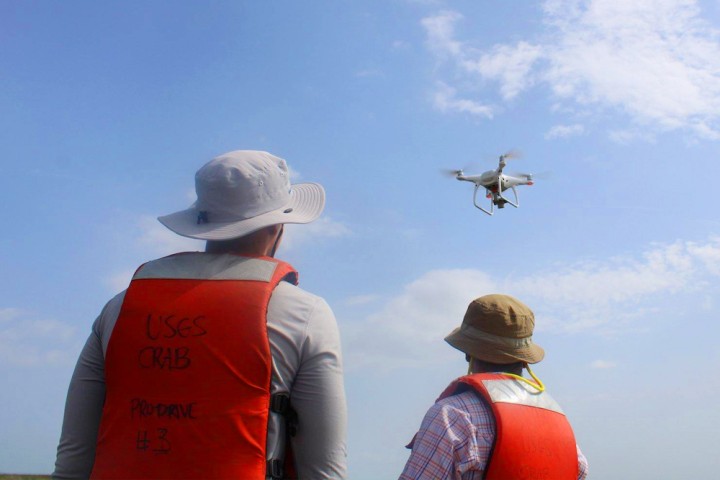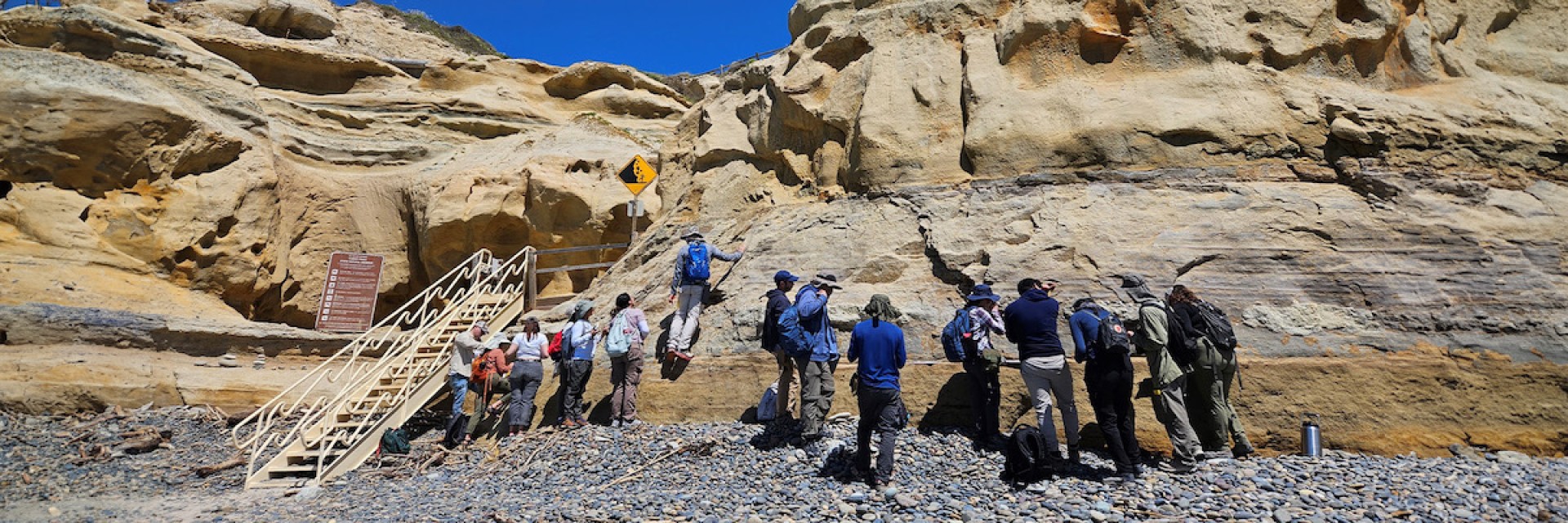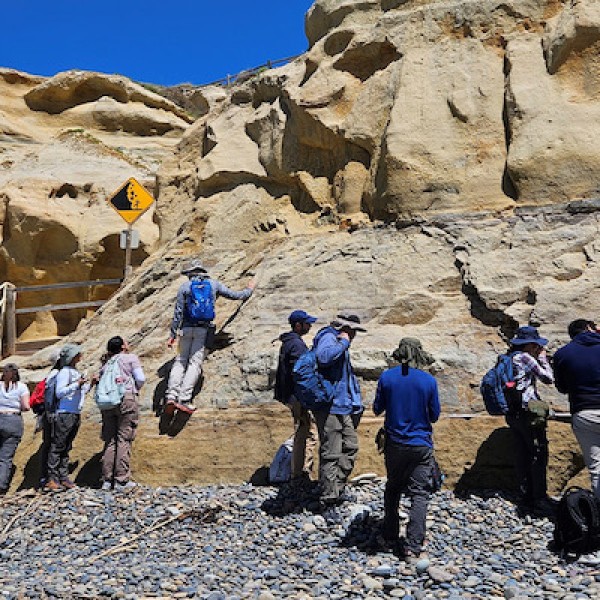Cal State LA’s Geography program prepares students to address critical issues like climate change, migration, and socio-economic disparities. With skills in spatial analysis and mapping, graduates lead community projects, advocate for sustainability, and navigate our interconnected world.

Why Study Geography?
Cal State LA’s Geography program empowers students to navigate the complexities of our contemporary world and prepares them to contribute meaningfully to their local communities and to our interconnected global society. Through a geographic lens, students gain insights into critical societal issues such as climate change, migration patterns, and socio-economic disparities. Additionally, the Geography program trains students in spatial analysis, mapping, and data interpretation, which are increasingly sought-after skills in our technology-driven society.
A Rewarding
Career
According to the Bureau of Labor Statistics, the 2022 median salary for Geographers was $88,900 per year ($42.74 per hour). Geography graduates are employed in a wide variety of fields, including Local, State, and Federal Governments, Non-Governmental Organizations, and Private Industry. For more information about Careers in Geography, go to the American Association of Geographers Jobs and Careers page
Below is a list of some common career paths for Geographers.
- Geographic Information Systems (GIS) Analyst: Analyze and interpret spatial patterns in complex geographical data to help solve problems in various industries, such as urban planning, environmental management, and public health.
- Cartographer: Create accurate and informative maps, for different purposes, including navigation, urban planning, and environmental analysis.
- Urban Planner: Contribute to the creation of sustainable and well-designed communities.
- Environmental Consultant: Address challenges such as climate change, conservation, and sustainable development, which can help organizations navigate and comply with environmental regulations.
- Community Development Specialist: Address local challenges, such as housing, infrastructure, and social equity.
- Transportation Planner: Contribute to the efficient and sustainable design of transportation systems, including roads, public transit, and bike paths.
- Climate Change Analyst: Assess the impacts of climate change, developing mitigation strategies, and contributing to environmental conservation efforts.
- Market Research Analyst: Analyze geographic trends and consumer behavior for businesses.
- GIS Software Developer: Create and improve software tools used in geographic information systems for data analysis and visualization.
Why Geography at Cal State LA?
Cal State LA, located in the heart of Los Angeles, is surrounded by dynamic and diverse communities that serve as a living laboratory for geographical exploration. Cal State LA's urban location provides students with unparalleled opportunities to engage with real-world issues, such as urban planning, environmental sustainability, and cultural diversity. The vibrant cityscape becomes an extension of the classroom, offering students practical experiences and exposure to a myriad of geographic phenomena. Beyond the academic advantages, the urban setting opens doors to internships, research collaborations, and community engagement initiatives that uniquely enrich the study of Geography at Cal State LA. Students from the Geography program have researched a wide variety of topics, including air pollution and environmental justice, Urban Heat Islands and public health, river habitat mapping and hydrodynamic modeling.
Courses
The total number of units required for the Bachelor of Arts degree in Geography is 120 units, of which 43 units are in the major. Consult with an advisor for the specific number of units required in all areas of the degree including GE courses and free electives.
- GEOG 1550 - Cultural Geography [3]
- GEOG 1600 - Physical Geography [3]
- GEOG 2680 - Introduction to Geospatial Sciences [4]
- GEOG 2820 - Spatial Measurement and Elementary Statistics [3]
- GEOG 3120 - Global Climate Change (also listed as GEOL 3120) [3]
- GEOG 3690 - Fundamentals of Geographic Information Systems [3]
- GEOG 4460 - U.S. Ethnic Communities [3]
- GEOG 4900 - Research Design [3]
- GEOG 4950 - Senior Thesis [3]
Complete 15 units from the following list with at least 12 units of upper-division courses. The selection must include at least 9 units of GEOG courses.
-
Lower-Division Courses
- GEOL 1500 - Earth Revealed [3]
- GEOL 1550 - Oceanography [3]
- GEOL 1580 - Natural Disasters [3]
- GEOG 1700 - Meteorology [3]
- URBA 1800 - The Urban World [3]
-
Upper-Division Courses
- GEOG 3090 - Urban Environmental Pollution [3]
- GEOG 3100 - Urban Climatology [3]
- GEOG 3130 - Climate Change and Migration (also listed as LAS 3130) [3]
- GEOG 3330 - Environment and Development in the Third World (also listed as GEOL 3330) [3]
- GEOL 3570 - Urban Geology [3]
- GEOG 3700 - World Regional Geography [3]
- GEOG 3760 - Urban Spatial Process and Patterns [3]
- GEOG 4020 - Geomorphology [3]
- GEOG 4030 - Environment and Food Customs [3]
- GEOG 4070 - Biogeography [3]
- GEOG 4100 - Applied Climatology [3]
- GEOG 4150 - Perspectives on Environment [3]
- GEOG 4310 - California [3]
- GEOL 4350 - Coastal Processes and Environments [3]
- GEOG 4510 - Historical Geography of North America [3]
- GEOG 4540 - Special Topics in Geography [3]
- GEOG 4570 - Transportation Geography [3]
- GEOG 4580 - Urban Transportation [3]
- GEOG 4620 - Geographic Information Systems (GIS) Applications [3]
- GEOG 4660 - Remote Sensing [3]
- GEOG 4680 - Digital Cartography [3]
- GEOG 4690 - Spatial Analysis and GIS Modeling [3]
- GEOG 4700 - GIS Programming and Customization [3]
- GEOG 4760 - Urban Geography [3]
- GEOG 4800 - GIS for Community Advocacy [3]
- GEOG 4820 - Multivariate Statistics in Geospatial Sciences [3]
- GEOL 4870 - Watershed Analysis [3]
- GEOG 4990 - Undergraduate Directed Study [1-6]
- POLS 4040 - Urban Government and Politics [3]
- POLS 4060 - Los Angeles City Politics [3]
- POLS 4610 - Dynamics of Urban Administration [3]
- SOC 4300 - Urban Sociology [3]
- SOC 4870 - Environmental Policy, Law, and Society [3]


